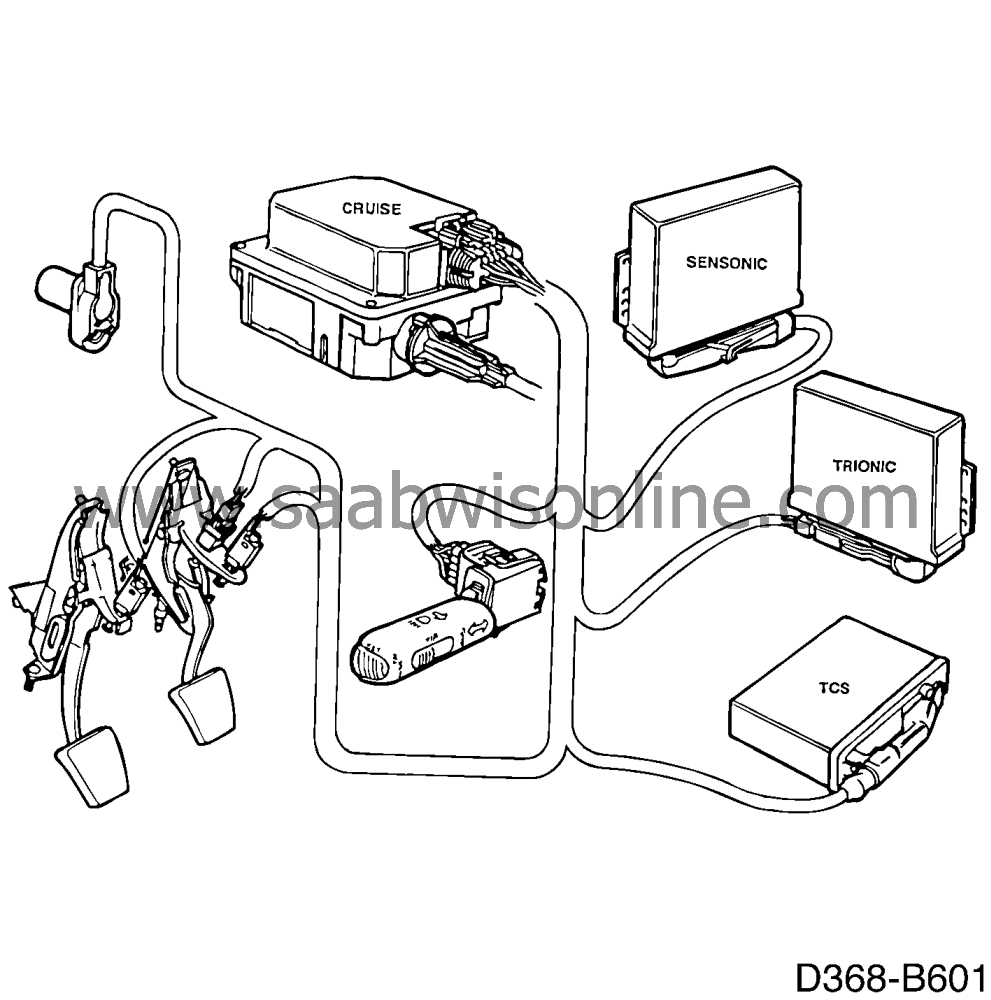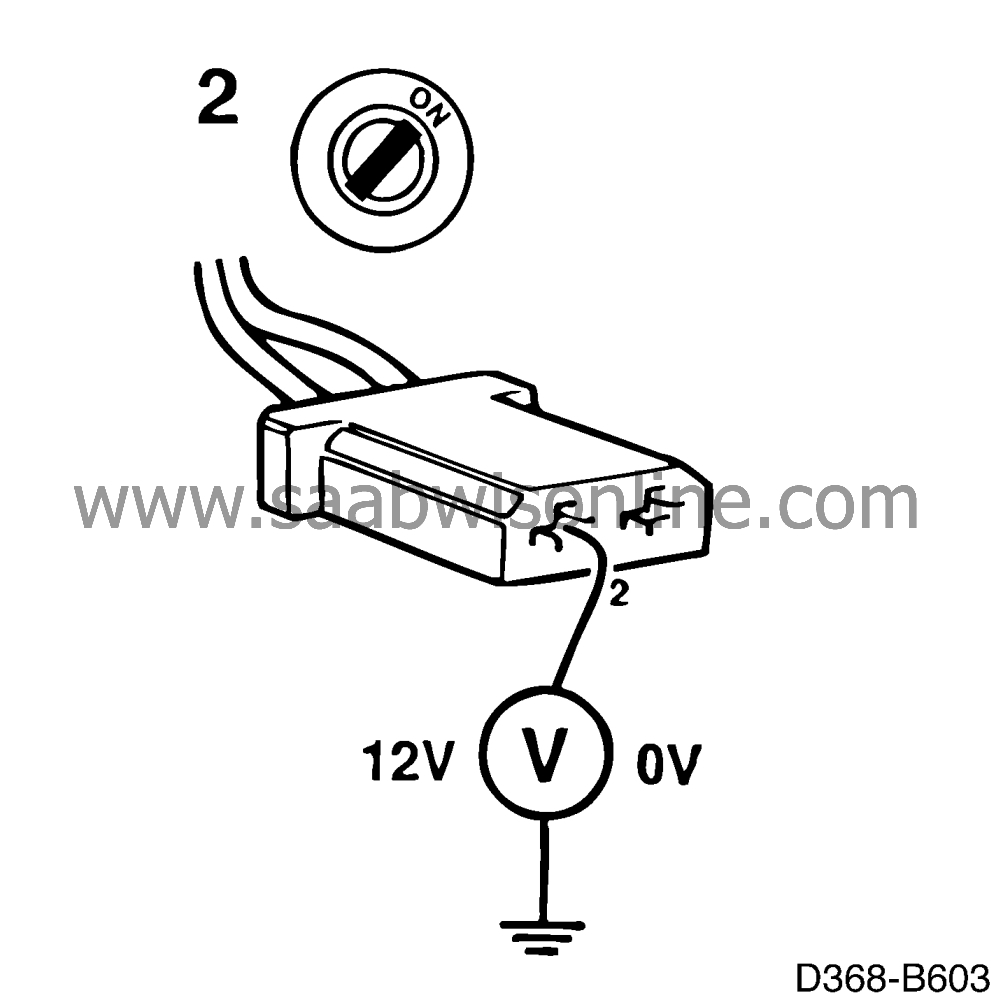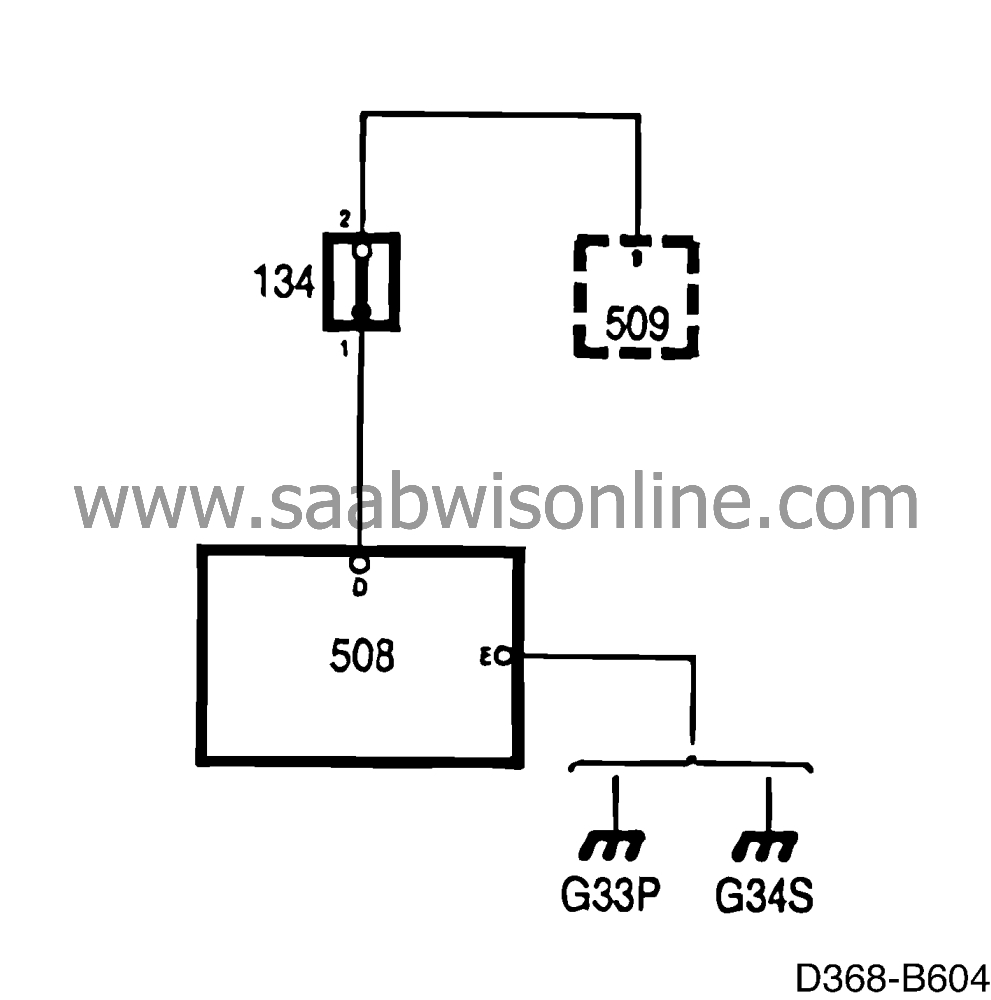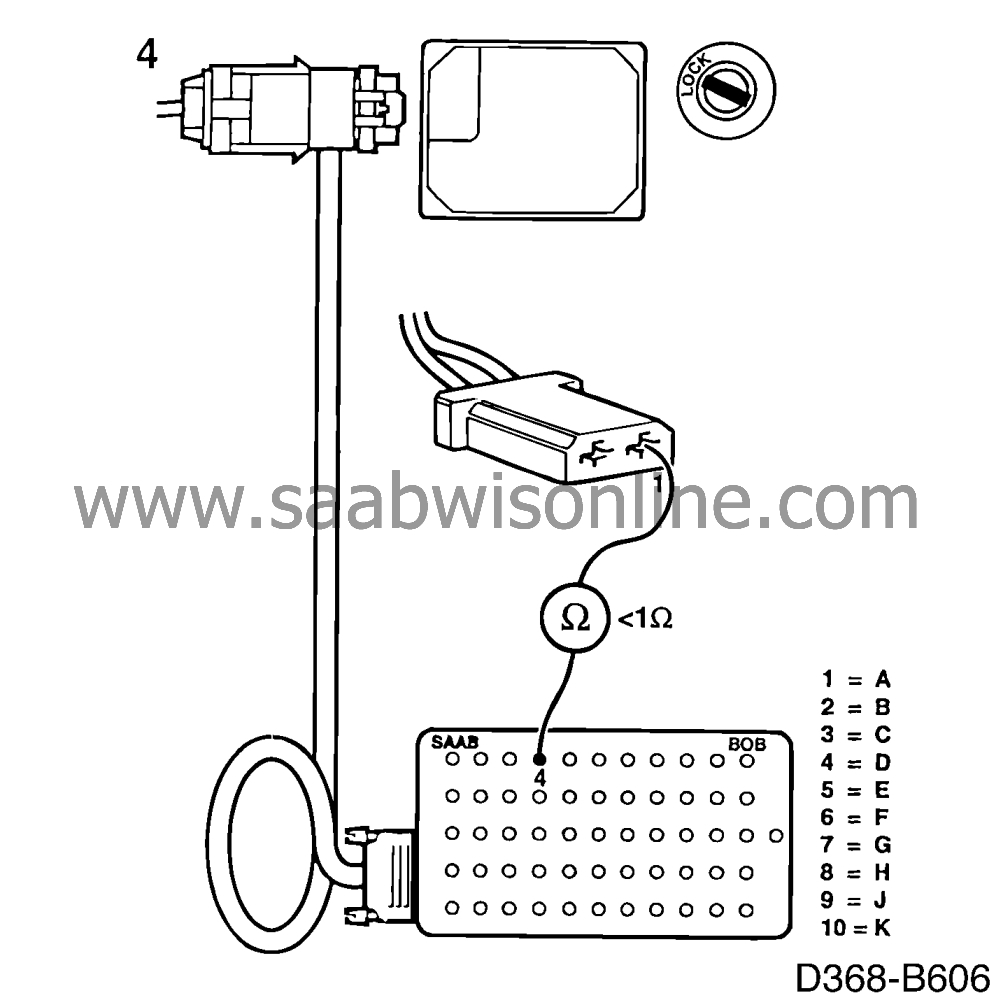Faultdiagnosis, Cruise Control on cars with Saab Sensonic
| SERVICE INFORMATION | |
| Bulletin Nbr: | 368-1594 |
| Date: ........... | FEBRUARI 1995 |
| Market: | ALL |
| Fault diagnosis, Cruise Control on cars with Saab Sensonic |
| Cars concerned |
All Saab 900 M94- models equipped with Saab Sensonic (automatic clutch operation).
| Background |
Service Manual 3:5 "Electrical system, Cruise Control" has no section covering fault diagnosis and the diagnostic procedure for cars equipped with Saab Sensonic. This SI therefore contains a diagnostics schedule for all cars and a specific fault diagnosis procedure for the Cruise Control system on cars with Saab Sensonic. In other respects, proceed as described in Service Manual 3:5 "Electrical system, Cruise Control"
 .
.
| Procedure |
Use the diagnostics schedule on the next page to find out where the fault is located.
| Diagnosis |
To carry out fault diagnosis, use the Cruise Control switches and the clutch and brake pedals. On cars with automatic transmission or Saab Sensonic, use the Cruise Control switches, the brake pedal and the selector lever or gear lever.
Start fault diagnosis by checking:
| 1. |
The fuses.
|
|
| 2. |
The +54 power supply.
|
|
| 3. |
The ground connections.
|
|
| 4. |
The connections in the control module connector for possible pin slide-out.
Carry out fault diagnosis in the diagnostics mode. To enter diagnostics mode, see the table below. To leave the diagnostics mode. Accelerate to a speed above 32 km/h (20 mph) or switch off the ignition. If you make a mistake while in diagnostics mode you will be returned automatically to point 5 and have to start from there once again. |
|
|
|
Procedure
|
CRUISE
lamp
|
Check
|
|
|
1
|
The engine should be switched off and
the handbrake applied.
|
|
|
|
|
2
|
Automatic: selector lever in N (P, R).
Manual: clutch pedal depressed.
|
|
|
|
|
3
|
Move the switch to TIP and hold it there
while starting the engine.
|
|
|
|
|
|
The Cruise lamp should light up to
confirm that you are in diagnostics mode.
|
Lights up
Does not light up |
|
|
|
4
|
Release the TIP button
|
Goes out
Does not go out |
TIP function
|
|
|
5
|
Press the SET button
|
Lights up
Does not light up |
SET function
|
|
|
|
Release the SET button
|
Goes out
Does not go out |
SET function
|
|
|
7
|
Move the switch to the RES/
position
|
Lights up
Does not light up |
RESUME function
|
|
|
8
|
Release RES/
|
Goes out
Does not go out |
RESUME function
|
|
|
9
|
Move the switch to the ON/OFF
position
|
Lights up
Does not light up |
ON/OFF function
|
|
|
10
|
Release ON/OFF
|
Goes out
Does not go out |
ON/OFF function
|
|
|
11
|
Automatic: move the selector lever to D
(3, 2, 1)
Manual: release the clutch pedal Sensonic: select reverse gear (R) |
Lights up
Does not light up |
Automatic:
Gear selector position sensor Manual: Clutch pedal switch Sensonic: signal from control module |
|
|
12
|
Depress the brake pedal
|
Goes out
Does not go out |
Brake pedal switch
|
|
|
13
|
Release the brake pedal
|
Lights up
Does not light up |
Brake pedal switch
|
|
|
14
|
Automatic: move the selector lever to N
(P, R)
Manual: depress the clutch pedal Sensonic: select neutral (N) |
Goes out
Does not go out |
Automatic:
Gear selector position sensor Manual: clutch pedal switch Sensonic: signal from control module |
|
|
15
|
Depress the brake pedal for about 5
seconds. After about 5 seconds:
|
Lights up
Does not light up Goes out Does not go out |
Brake light switch
Control module |
|
|
16
|
Release the brake pedal
|
Throttle opens briefly Throttle does not
open
|
Stepping motor/cable
|
|
|
17
|
Drive off slowly
|
Lamp flashes in time with speed Lamp does not
flash
|
Speed signal
|
| Checking the pedal switch |
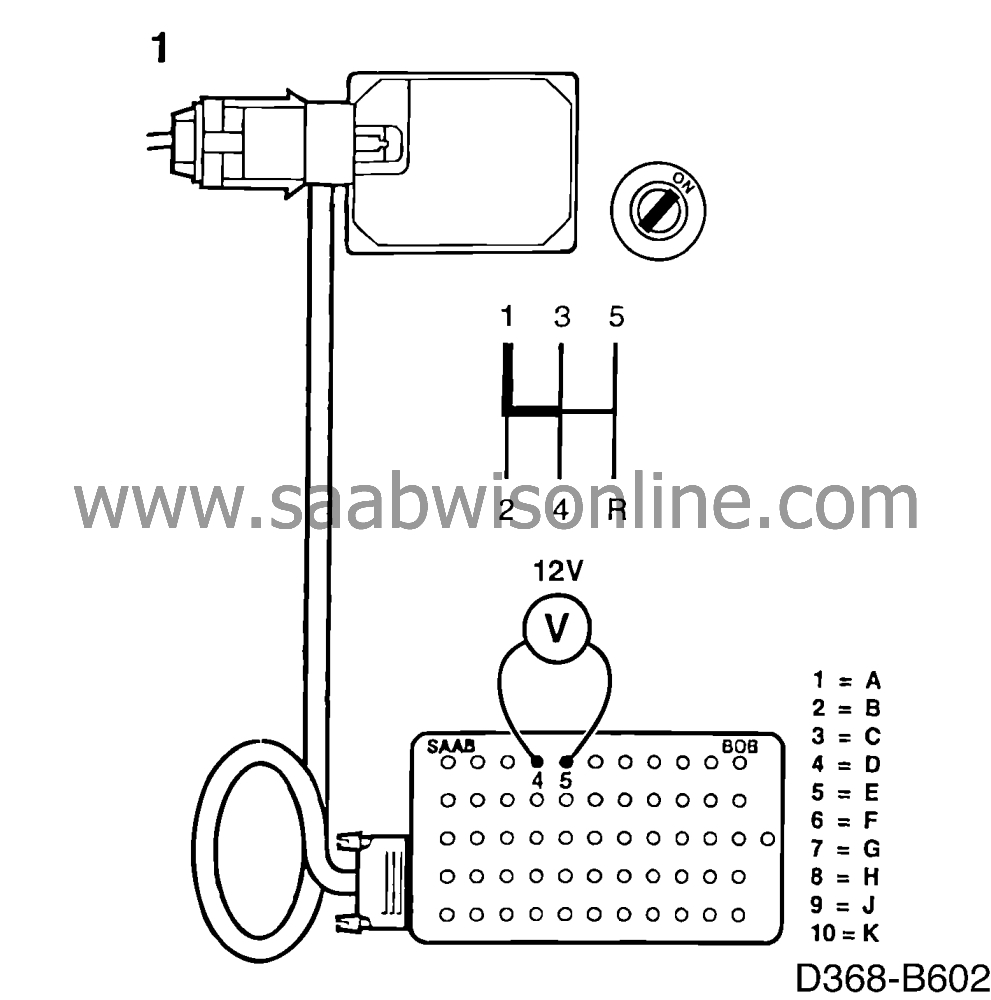
| 1. |
Connect a BOB and check that
a reading of 12 V is obtained across terminal D (4) of the Cruise Control connector and a
good ground when the gear lever is in 1st gear.
|
|

